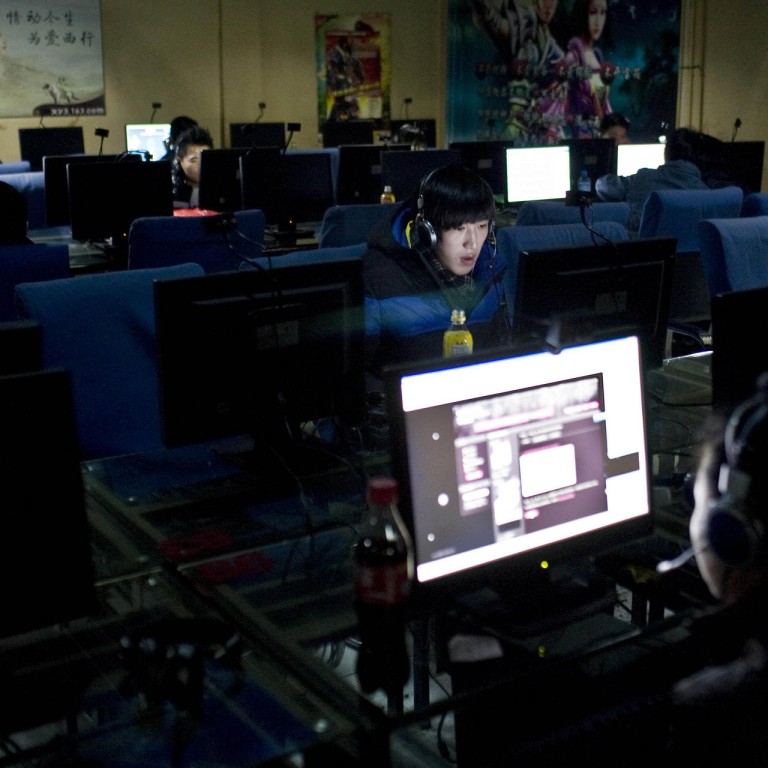
Internet addiction can cause psychological disturbances
Last month, Sun Xinying and six other researchers from various academic centres in Beijing interviewed almost 11,000 Chinese teenagers using a number of diagnostic evaluations and found evidence linking internet addiction and decreased well-being. Students who showed signs of internet addiction had lower self-esteem, decreased satisfaction with life and signs of depression.
The American Psychiatric Association and other psychiatry experts agree that internet addiction disorder (IAD), also called internet use disorder, is a growing social issue causing psychological and neurobiological disturbances.
Last year , Professor Tian Jie from the Institute of Automation at the Chinese Academy of Sciences conducted a study into the effects of internet addiction on the micro structural integrity of neuronal fibre pathways. Study results suggest that long-term internet addiction results in structural alterations to the brain, and the team concluded that IAD contributed to chronic dysfunction.
Although IAD is controversial, the American Psychiatric Association is including it in the fifth edition of (DSM-5) - used as the standardised classification system by mental health practitioners in the US. Next year IAD will qualify as a legitimate mental illness, "requiring further study".
How can families and health professionals assess and treat a disorder that is not yet included in practice guidelines?
In March, Professor Zhang Qinyuan, a researcher at Shandong University in China, led a study to evaluate and observe the efficacy of traditional Chinese medicine on patients suffering from internet addiction. After assessing 4,000 students for IAD, 114 cases were randomly selected for study. Symptoms included depression, insomnia, restlessness, and decreased appetite.
Treatment strategies for each case included Chinese herbal prescriptions for depression and acupuncture treatment in combination with regular psychological counselling. A 20 per cent reduction in symptoms was reported.
According to the Chinese Internet Network Information Centre (Cinic), as of September this year there were 538 million internet users on the mainland. More than 26 per cent of net users are between the ages of 10 and 19.
In 2010, the China Youth Association for Network Development claimed that more than 24 million young mainlanders were addicted to the internet and/or online gaming.
In Hong Kong, where there are a total of 5.3 million internet users, a 2010 University of Hong Kong study found that about one in 15 local teenagers displayed five or more symptoms of internet addiction.
Zhang says internet addiction is a very common problem in China, but he believes the addiction is more common for one demographic in particular. "Most patients are between the ages of 18 and 24, and male."
Zhang's research revealed a number of causes: weak family relationships, heavy academic pressure and a need to escape reality. Zhang believes in the efficacy of traditional Chinese medicine to help internet addiction, although he has little evidence to back this up.
Dr Kimberly Young, founder and director of the Centre for Internet Addiction Recovery in the US, hopes that future studies will look into the efficacy of acupuncture and alternative medicine for the recovery of internet addiction, and confirms there is little evidence supporting a wide variety of therapies for a very modern disorder.
"No research has studied alternative medicine with internet addiction. I think it does help; I am a firm believer in acupuncture and alternative therapies," says Young.
She believes that cognitive behavioural therapy offers the most promise, but confirms current opinion: "There just aren't enough treatment programmes to tell what practices work best."
This month, published a summary of research and practice on internet addiction treatment. Hilarie Cash, lead author of the summary and executive director of reSTART: Internet Addiction Recovery Programme in Washington state, believes combination treatments such as "psychotherapy, psychoeducation, getting the client away from digital technology for a minimum of 45 days, physical fitness training, meditation and 12-step programmes" work well.
Surveys in the US and Europe indicate prevalence rates between 1.5 and 8.2 per cent.
There is a surprising lack of study to support guidelines for IAD recovery, with most evidence for pharmacological, psychological or alternative medicine stemming from small population studies with "low-methodological quality".
Even so, treatment for internet addiction is advancing rapidly without formal practice guidelines, because medical experts are making inroads on their own, and reporting their results.
Pharmacological intervention using antidepressants, and anti-anxiety medication, is often utilised, although there is little evidence of its efficacy.
Psychological approaches, including family intervention, counselling and training, as well as cognitive behavioural therapy have given the most promising results.
For some experts, being "addicted" to the internet is more likely a compulsive behaviour, while other psychiatrists argue that IAD shares features that characterise drug or substance addictions, including excessive use and withdrawal symptoms.
Others believe that "addiction is addiction" whether related to overeating, gambling, alcoholism or obsession with .
